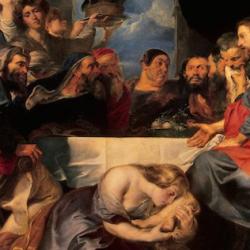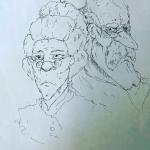Jesus on Trial, Luke 22:63?E3:25
INTRODUCTION
Jesus?Etrial takes place in four stages: He is first brought before the Jewish Sanhedrin, who send Him to the Roman governor Pilate, who sends Him to Herod, who sends Him back to Pilate for a final verdict and sentence. At each stage, Jesus is rejected, mocked, and beaten. Yet, throughout His trials, the courts find Him innocent (23:4, 14-15). He goes to His death as the spotless, innocent Passover Lamb, substituting for robbers and murderers.
THE TEXT
?Now the men who held Jesus mocked Him and beat Him. And having blindfolded Him, they struck Him on the face and asked Him, saying, ?Prophesy! Who is the one who struck you??E(Luke 22:63?E3:25).
PROPHESY
In the first stage of His trial, Jesus stands before the Sanhedrin, the court of Jewish elders, also called the ?Presbytery?E(22:66). Two issues dominate this part of the trial. First, the ?men who were holding Jesus in custody?E(v. 63), that is, the chief priests, officers of the temple, and elders (v. 52), mock his claim to be a prophet. Though Jesus does not answer their mocking questions, their conduct in fact proves that Jesus is a prophet, since He had earlier predicted that this would happen (cf. 18:32).
Second, the Sanhedrin proper focuses on Jesus?Eclaims to be Messiah or Christ, the Anointed One (v. 67). This is not really an investigation, since the council has already made up its mind that Jesus is not the Christ. They are trying to catch Jesus saying something that will make him seem dangerous to the Romans (cf. 20:19-26). Since ?Christ?Eand ?Son of God?Eare royal titles, if Jesus admits that He is Christ they can bring Him before Pilate.
Jesus?Eanswers are evasive (vv. 67-68, 70), or else He remains completely silent. What else can we expect? Jesus has been seeking to persuade and debate with the Jewish leaders for several years, and they have grown increasingly hostile. They have been beating Him and mocking His claim to be a prophet. Can there be any reasonable discussion now? Jesus knows that there is no possibility of persuasion. But there is another thing going on as well: Jesus is the Lamb who is being led dumb to the shearers (Isaiah 53:7). Instead of offering an extended speech before the courts, as many Hellenistic heroes did and as Paul does in Acts, Jesus says almost nothing and makes no defense. He knows there is a Judge beyond the judges He faces, and He trusts that Judge to vindicate Him.
KING OF THE JEWS
When the priests take Jesus before Pilate, they focus on the political dimensions of Jesus?EMessianic claims. Jesus, they tell Pilate, has claimed to be a Jewish king, and he is encouraging a tax revolt among the Jews (23:2). Several times, they accuse Jesus of stirring up the people (vv. 2, 5, 14), positioning themselves as the defenders of the misled sheep.
Pilate, however, repeatedly declares Jesus innocent (vv. 4, 14-15, 22). This has several implications. First, that Jesus?Edeath is the result of a gross miscarriage of justice. Pilate knows Jesus to be innocent, but buckles to the pressure of the Jewish mob and kills Jesus anyway. Jesus is again ?exposing hearts,?Ebringing to light the injustice at the heart of the vaunted Roman legal and judicial system. In this sense, Pilate (and with him Rome) is more the one on trial than Jesus. Second, Pilate is inadvertently pronouncing God?s own verdict on Jesus, a verdict that God will promulgate when He raises Jesus from the dead. Third, this leaves the Jews primarily responsible for the death of Jesus, who is ultimately ?delivered . . . to their will?E(v. 25). The elect people are the leaders in rejecting Jesus.
The Jews know what makes Pilate tick. As a Roman prefect, he is especially concerned with public order, and anyone stirring up the people ?Eregardless of whether or not he claims to be a king ?Eis a threat to public order (v. 5), especially during a major festival. Pilate discovers a potential out when he learns that Jesus is a Galilean. Herod can take care of the problem.
BEFORE THE FOX
Herod has been wanting to see Jesus for a long time, suspecting that Jesus is some reborn prophet (9:7-9). Later, Jesus was warned before that Herod was out to kill Him (13:31), just as he had killed John the Baptist. Jesus described Herod as a ?fox?Ewho was loose in the henhouse; Jesus wanted to act as a mother hen, and protect Jerusalem, but Jerusalem was unwilling (13:32-35). Now, Jesus, the chicks bring the protective hen before the fox himself, which leaves them wholly without protection from the coming wrath. Yet, this is no obstacle to Jesus. When warned about Herod?s plans, He sent a response back to Herod: ?Behold, I cast out demons and perform cures today and tomorrow, and the next day I reach my goal?E(13:32). Herod?s threats were no obstacle to Jesus; Herod would be part of the means to Jesus reaching that goal, ?for it cannot be that a prophet should perish outside Jerusalem?E(13:33).
Herod gets into the spirit of the trial. He and his soldiers, following the lead of the Sanhedrin, mock Jesus, especially His royal claims. Herod shows that he shares Pilate?s contempt for Jewish kings, and they unite in their hostility to Jesus. When Pilate sent Jesus to Herod, he recognized Herod?s authority (v. 7), and this sign of honor from Pilate was a basis for an alliance. At another level, however, the reconciliation of Pilate and Herod points to the real purpose of Jesus?Edeath, to undo the division of Roman and Jew, and to unite them in friendship. This is an infernal parody of Christian communion, but it points to the true communion.
BARABBAS OR JESUS?
Finally, the chief priests and rulers go before Pilate one last time, this time accompanied by the ?people?E(v. 13). Apparently, some of the people at least have been convinced that Jesus was misleading them, and have turned on Him. When Pilate offers to punish Jesus and set Him free, the Jews demand that Jesus be crucified and Barabbas released (v. 18). The irony is sharp: The Jewish leaders have been accusing Jesus of being a political threat, and yet they are willing that Barabbas be released, who has actually been leading rebellions (v. 19). The Jewish leaders have selective indignation at rebels.
Here again, there is far more going on than Pilate or the Jews realize. The choice of Barabbas over Jesus is the choice of insurrection over peace, and the Jews will pay dearly for that choice within a generation. Further, this episode dramatically highlights what is really going on in Jesus?Etrial: He is standing trial as a substitute, being put to death for sins that He did not commit, sins that were endorsed by many of the Jews. Even more, we are all Barabbas, rebels against God and participants in the murder of Jesus. Yet, Jesus takes our place and bears the punishment of our sins in Himself. We are sons of Adam, who was a rebellious Bar-Abba (?son of the father?E; but the Son of the Father, the eternal Bar-Abba, takes our place.
CONCLUSION
Jesus is indeed ?despised and rejected of men?E(Isaiah 53:3). Through all this, we should not forget who Jesus is: He is ?the Lord?E(22:61), Yahweh incarnate. Yahweh is rejected by the Jews, His own people; by the Romans; by Herod. God the Son, the Lord, enters human history, and is greeted with the full fury of human resentment and sin and envy. We, all of us, mock Him, spit at Him, beat Him, kill Him. He receives it, absorbs it Himself, and thereby redeems us. This is the strange justice of God: The Judge is judged in our place, accepting condemnation from those who should be on trial.
Behold your God.















